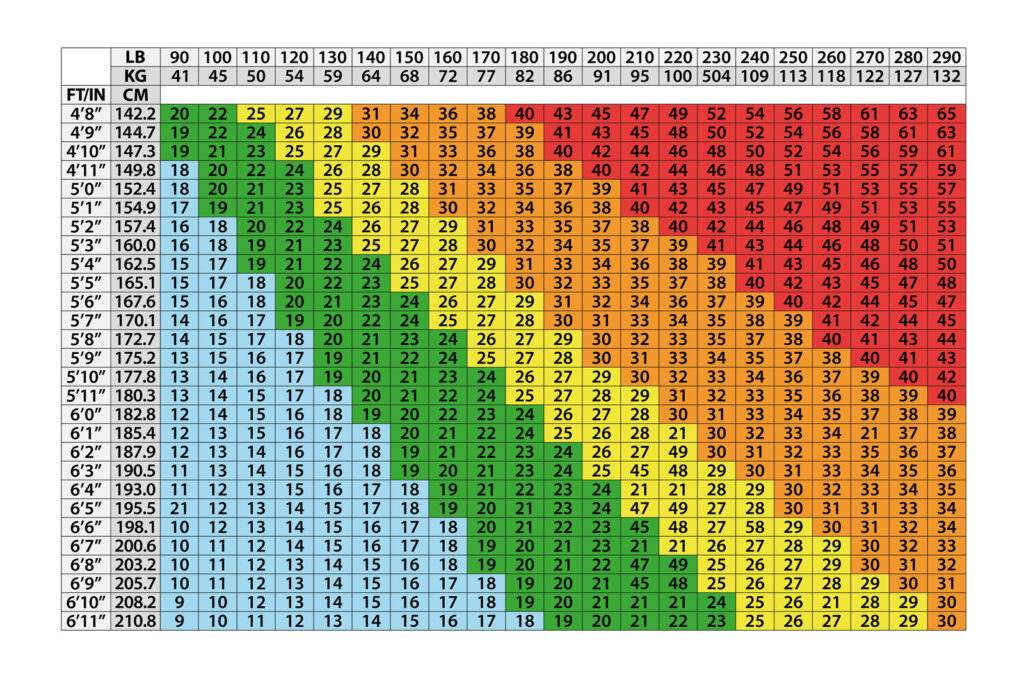How Much Should I Run According To My BMI?
Find out “How much you should run according to BMI” with this easy-to-follow guide.
If you’re worried about a high body mass index or trying to lose weight, taking up running can be a big help. Burning around 100 calories per mile, running is one of the highest calorie-burning activities. All you need to get started is a good pair of running shoes, (plus a sports bra for women).
But is running the right exercise for you and how much should you be running a week to hit your optimal BMI?

How Running Helps With Weight Loss
Losing weight in basic terms is about creating a calorie deficit. You’re trying to burn more calories a day through exercise and activities than you replace by eating.
There are 3 main ways to build a calorie deficit:
- just by eating less,
- just by exercising more,
- or by exercising more and eating fewer calories.
Sounds simple? The problem is those pounds you gained over the months and years can take a big commitment to shift.
Research by Max Wishnofsky way back in 1958 concluded it takes a deficit of 3500 calories to burn one pound of fat.
This is based on the big assumption that you’re losing only body fat and led to the myth that all it takes to hit your goals is to cut your calorie intake by 500 calories a day.

Just eat less to lose weight
There are two big problems with just eating less to hit a healthy body mass index.
- When you diet your body may break down muscles as well as body fat. According to Miranda-Comas MD, “A person who is attempting to lose weight by not eating may lose weight in muscle first before fat.”
- A deficit of 500 calories is about 25 to 30% of your daily calorie needs for a typical sedentary person. That’s a lot! Cut this amount of calories from your daily diet and you’ll only lose weight for a short time before your body adapts and hits a weight loss plateau.
Exercising more to burn body fat
Everyone likes to see rapid progress towards hitting their healthy weight goal when they start an exercise program and running can burn a lot of calories.
The only problem is, burning 500 calories a day from running will be too much for the beginner runner.
You can find out how many calories you burn running using this running calorie calculator. It’s based on your body weight, running speed, and duration.
For most people burning 500 calories relates to running 4 to 5 miles every day. Starting at this level as a beginner can quickly lead to burnout or injury.
Instead, you need to build up running gradually and watch your diet – people have the most success with losing weight if they combine running with improving their nutrition.
Exercising more and eating fewer calories
This is the sweet spot for weight loss and reducing body fat. You’re exercising to maintain your muscle mass and burn calories, but you’re also following a healthy diet, living a healthy lifestyle, and cutting back on high-calorie processed foods with little nutritional value.
Your running will need energy. So make sure you’re getting enough energy from your diet to fuel your running by eating nutritious food rich in a variety of fruit and vegetables with lean protein, whole grains, and healthy fats.
What Is A Healthy Body Weight?
Your body mass index (BMI) provides a rough indicator of healthy weight for adults aged 18 and over.
It’s based on your height and weight and is calculated by dividing your weight in kilograms (kg) by the square of your height in meters (m).
The medical profession uses it because of its simplicity. A BMI calculator will quickly tell you if your body is within a healthy weight range.
BMI Calculator And BMI Chart
Use this BMI healthy weight chart to find your body mass index:


BMI Ranges
Your calculated BMI is an indicator of your overall health. Being overweight or obese with a high body fat percentage increases your risk of severe illnesses such as high blood pressure, Type II diabetes, coronary heart disease, stroke, and chronic diseases such as certain types of cancer.
Using the calculator, find out, according to your BMI, if you are underweight, normal weight, overweight or obese:
Weight Category According To Your BMI
- Underweight = < 18.5
- Normal weight = 18.5 – 24.9
- Overweight = 25 – 29.9
- Obese = BMI of 30 or greater
Limitations of Body Mass Index (BMI)
Although your body mass index is a useful tool, it’s far from perfect. Use it with caution and if in any doubt seek advice from a health professional.
These are some of the limitations of using the BMI calculator:
- Muscle mass: the BMI calculation is based on height and weight only and doesn’t account for muscle mass or body fat percentage.
- A healthy muscular athlete is often considered overweight according to their BMI despite having very low body fat.
- Older adults with low muscle mass can have a normal weight BMI but still have health risks associated with high body fat.
- It doesn’t take into account different body types.
Avoid using the BMI calculator if you’re under 18, pregnant, or suffer from an eating disorder.
Related post: Fat vs. Muscle: How Does It Affect Your Weight?

How Much Running According To Your BMI?
So how much do you need to run to reach your ideal weight range? It mainly depends on your starting point.
- If you’re used to exercising and only have a few pounds to lose, you can start by walking 4 to 5 miles a day and gradually switch walk miles for run miles. Follow this Running For Weight Loss Plan.
- If you have a high BMI, it’s best to start with a Walking For Weight Loss Plan. It’s easier on your joints with less impact and it’s a safer way to start exercising when you’re carrying a lot of excess weight or haven’t exercised in years. Make sure you get a check-up from a medical professional before starting your exercise plan.
- If you’re already a runner, it’s still possible to be overweight. Maybe you’ve been running for years, you’re in your comfort zone and eating too much. Try improving your diet, make your running more challenging, and try to get back your runner’s body!
Related post: How Much Should I Walk According To My BMI?
How Far Do You Need To Run Every Day?
The distance you run every day will be dictated by how far you can safely run without getting injured. If you’re a complete beginner, start with a Couch to 5K Plan.
It’s not a weight loss plan because even by week 9, Couch to 5K is only running 90 minutes per week. For most people that’s less than 9 miles. But it will help you build up your running and adapt to an active lifestyle. Combined with eating healthy foods and eating within your daily calorie limit– you will see those numbers drop on the scale.
Running 5 miles a day or 35 miles a week is the suggested distance for weight loss provided you build up to running this distance slowly – over at least 3 to 4 months if you’re new to running. Instead of running every day, it’s normally best to take 1 or 2 rest days a week and give your body a chance to repair and recover.
Even if you’re running 5 miles a day, you’ll still need to keep challenging your body as you become more efficient at running. Add some faster speed sessions, run uphills, and add strength training. Strength training – core, hip, and leg exercises, will improve muscle mass and help protect against injury. Try these bodyweight exercises for runners.

What Is An Ideal Running Weight?
Sadly achieving an ideal race weight represents the ugly side of athletics. While weight will have an impact on running speed, it’s only one factor affecting your running performance.
By all means, make sure you’re in a healthy weight range but if you find yourself obsessed with hitting a low BMI or if you’re underweight, seek advice from a health professional.
Most coaches today are aware of the risks of encouraging low body weights in their runners. But if you find yourself under pressure to reduce your weight, seek advice outside your coaching team from a medical professional.
Related post: How To Get A Runner’s Body
Thoughts From Love Life Be Fit
How much weight you’ll lose from running will depend on how far you run, how much you challenge yourself, and your diet. Treating yourself to a chocolate brownie post-run will quickly wipe out any calorie deficit from running.
How much should I run according to my BMI? It’s regular running that makes the difference. Build up your running slowly to avoid injury and find fun ways to stay motivated. If you have a high BMI start with walking or try Couch to 5K.
Being overweight is just one reason to start running. It’s terrific for your overall health and can seriously change your life… Just be warned – running is addictive!








